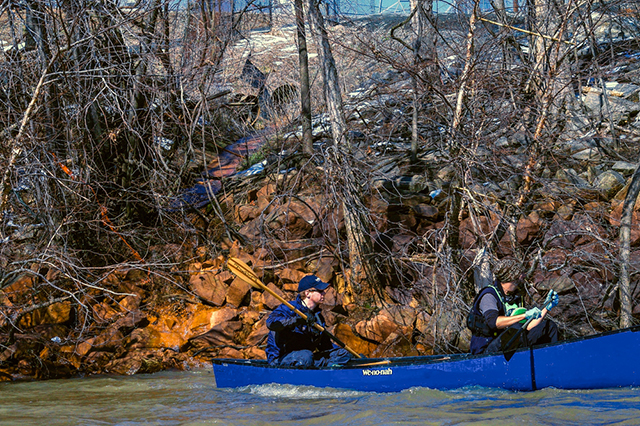
Disasters on our waterways have been occurring at an unprecedented rate in a climate of lax government regulations. In February, 140,000 tons of toxic coal ash sludge and wastewater leaked into North Carolina’s Dan River, highlighting why boots on the ground activism is crucial.
Over the course of 2014, a series of unprecedented disasters have unfolded on our nation’s waterways, contaminating drinking water supplies and endangering the public health and safety of communities. When a chemical used to wash coal (4-methylcyclohexane methanol, or MCHM) leaked into the Elk River in West Virginia from a storage facility on January 9, 2014, more than 300,000 residents were left without water to drink. As MCHM is not listed in the Environmental Protection Agency’s (EPA) public database of toxic chemicals and is not federally regulated, this incident showcased just how vulnerable we all are to facing a similar fate due to lax state and federal environmental protections that allow many facilities and chemicals to evade scrutiny.
The rapidly increasing volume of toxic, volatile crude oil transported by rail and barge has upped the ante on the risk of future accidents even more. A McClatchy analysis of federal data from the Pipeline and Hazardous Materials Safety Administration showed that more oil was spilled from rail cars in 2013 than in the prior 40 years combined.
And the list goes on. In February 2014, a collapsed storm water pipe released 140,000 tons of toxic coal ash sludge and wastewater into the Dan River in North Carolina, a public drinking water supply for downstream communities like Danville, Virginia. State regulators and Duke Energy, the company responsible for the spill, waited more than 24 hours before notifying the public that it had happened. Adding insult to injury, just weeks after this catastrophic spill, it was discovered that Duke Energy had deliberately and illegally dumped 61 million gallons of coal ash into the Cape Fear River.
As the threats increase, heightened advocacy continues for protections and regulations that will safeguard our precious waterways and communities. However, more needs to be done than crossing our fingers and hoping for the best that a disaster doesn’t strike again before necessary action is taken. As part of the solution, Waterkeeper Alliance has launched a rapid response program based on a proven protocol in responding to and remediating some of the nation’s worst waterway disasters. Waterkeeper Alliance staff and local Waterkeepers provided on-the-ground support, water quality testing and advocacy for the Dan River incident and again in Lynchburg, Virginia, when a train carrying volatile Bakken crude oil derailed and exploded, spilling an estimated 50,000 gallons of oil into the James River. In past years, Waterkeepers have responded to Hurricanes Floyd and Sandy and the BP oil disaster in the Gulf of Mexico.
Deploying a highly trained team of advocates and experts by boat and aircraft to assess a situation, test the water, document the impact and rapidly share information with the media and the public allows those on the ground to work quickly to amplify the voice of effected communities. The truth about the impacts and dangers is dispersed in real time, ensuring that polluters and government officials don’t have the opportunity to downplay or cover up the threat. The response team then advocates for the waterway and affected communities until a cleanup plan is implemented. This requires a myriad of advocacy actions, including filing lawsuits and pursuing legislative remedies.
As a result of rapid response work by Waterkeeper Alliance and North Carolina Waterkeepers on the Dan River, Duke Energy has agreed to clean up not only the spill site, but also three other sites with leaking coal ash ponds in Asheville, Charlotte and Wilmington. Results of the Dan River spill were used to support litigation and successfully secure removal of coal ash ponds at other sites so that those communities and waterways are protected from additional coal ash disasters.
Throughout history, the biggest wins for the environment have been the result of citizens advocating for their rights. From the historic Storm King Mountain settlement to the passage of the Clean Water Act, to the founding of Waterkeeper Alliance itself, it is boots on the ground activism that ends up bringing about sorely needed change, and it is that same spirit that will carry us through defending our waterways in this climate of complicity by our government agencies that we live in today. As always, the people are the way forward and the last line of defense when communities are under assault from polluters.
Join us in defending the truth before it’s too late
The future of independent journalism is uncertain, and the consequences of losing it are too grave to ignore. To ensure Truthout remains safe, strong, and free, we need to raise $46,000 in the next 7 days. Every dollar raised goes directly toward the costs of producing news you can trust.
Please give what you can — because by supporting us with a tax-deductible donation, you’re not just preserving a source of news, you’re helping to safeguard what’s left of our democracy.